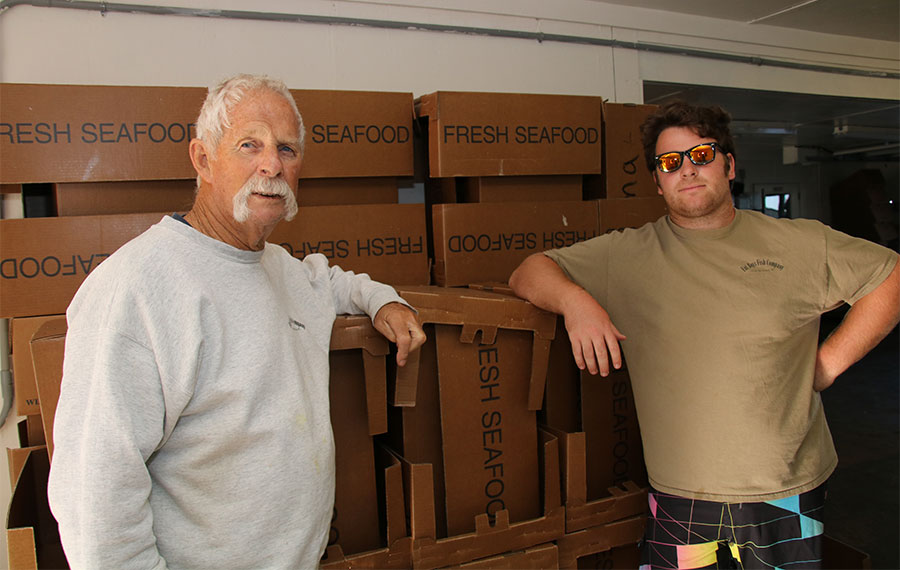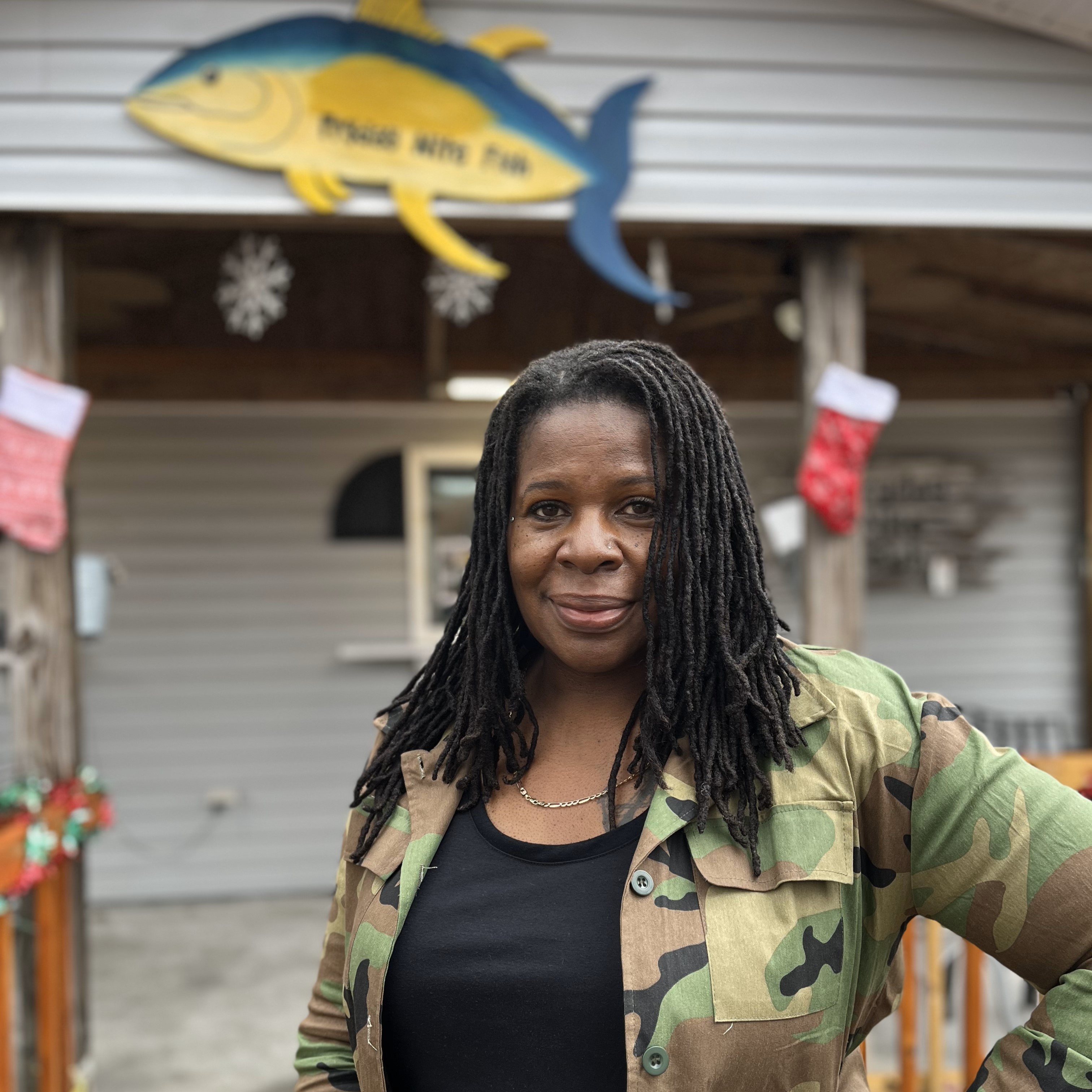Saving the Fish House

July 2019
Carolina Country Magazine
By Leah Chester-Davis
James Barrie Gaskill was a waterman to the core. Before he unexpectedly passed away in June 2017 while tending his nets, he would spend a portion of his day hanging out at the fish house on Ocracoke Island, watching the comings and goings of commercial fishermen and fisherwomen. He was a teacher and later principal at Ocracoke School, but for much of his life he made a living on the sea.
As he watched his son, Morty, fill large containers on his skiff with ice before pushing away from the dock to head out into Pamlico Sound, James Barrie shook his head. “He has a degree, and he has come back to this,” he said with a thick Ocracoke brogue and a mixture of incredulous wonder and fatherly pride.
James Barrie knew fishing is a difficult way to make a living. He knew the long days and the isolation it took to land a catch. He also knew how the island and its fishing heritage get in your blood. It’s been handed down from generation to generation on this barrier island that dates its first settlers back to the 1700s, including a long line of Gaskills.
The Call of the Sea
Morty grew up fishing with his Dad.
“I fished every summer, weekends, breaks,” he says. “I’ve had my own boat since I was 12. It’s what paid for college.”
After earning a degree from NC State University, Morty returned to the fishing community on this small island that sits at the southern tip of the Outer Banks. It’s made up of independent people who have survival woven into their DNA thanks to centuries of living on an isolated island at the mercy of the vagaries of Mother Nature.
With no doubts about returning to the island to work as a commercial fisherman, Morty says, “I like working for myself.” He grins and adds, “That’s a diplomatic way of saying I don’t like people.” His affable personality belies that statement and he clarifies with, “I like the independence. I like being outdoors.”
The fish house is absolutely crucial to the commercial fishing industy, he continues. “It’s too hard to sell product off the island. You need a lot of ice and it takes time to get to Swan Quarter or Hatteras Island. It’s much easier to offload here without worrying what to do with the fish. Without the infrastructure, it’s hard to fish.”
Ocracoke’s Fish House
A little more than 12 years ago, commercial fishing on Ocracoke faced extinction when the fish house, the last one on the island, closed. A fish house serves as the base of operations for commercial fishers, where they can offload their catch. The threat of its closure mobilized the entire community to come together to save a major part of their maritime heritage, in addition to the livelihood of the commercial fishers and the tourism industry.
Link to July 2007 Carolina Country article about the fish house closing
“You can’t call yourself a fishing village if you don’t have a fish house,” says Rudy Austin. “That’s what people expect.” Austin serves on the Board of Directors of Tideland EMC and runs Portsmouth Island Ferry and tours from Ocracoke.
Under the auspices of the Ocracoke Foundation, 35 part-time and full-time fishermen and fisherwomen formed the Ocracoke Working Watermen’s Association — James Barrie served on its board — and then established the Ocracoke Seafood Company as a for-profit subsidiary that has both a wholesale and a retail side. The association includes all who work on the water such as charter boats, recreational fishing and those who target species beyond fish, such as oysters, clams and crabs.
According to Gene Ballance, who handles the fish house books, the fish house helps keep historical jobs on the island. “It has kept the last of fishing alive on Ocracoke,” he says.
When Morty or any of the other fishers are headed back to Silver Lake Harbor, they make a cell phone call to the fish house to alert Shane Mason that they are headed in.
Shane manages Ocracoke Seafood Company’s fish house floor. From keeping everything washed down, clean and organized, to offloading boats, cleaning and shipping fish, to getting the retail store at the front of the fish house stocked each morning with fresh fish, Mason is an integral part of helping the commercial fishing industry on the island. He moves with quick efficiency, knowing the fishers have had long days on the water and their perishable catch will retain its excellent quality the sooner it’s packed on ice and moved onto a refrigerated truck for delivery. The fish are sent to the Wanchese Fish Company, which will ship them up the Eastern seaboard to New York.
Early each morning, Shane cleans and readies the fish to sell in the retail store of the fish house. He expertly maneuvers a sharp knife down the backbone of the fish. The cuts he makes are so swift that if you blink, you miss it, and he has already started on another fish.
He tosses the heads, tails and other waste to the pelicans bobbing in the water below. For them, it’s breakfast time, and each morning they perch on the many pilings near the fish house. As soon as Shane appears, they take their spots in the water below the deck, prepared for their morning treat.
“My father, uncle and grandfather were all commercial fishermen, and my stepfather is,” Shane says. “I like this part of it. I like seeing it all.”
Fresh, Local, Delicious
For visitors to the island, the Ocracoke Seafood Company is the place to stop (bring a cooler) for wild, fresh-caught seafood and to learn about the fishing heritage on the island. Store Manager Pattie Johnson Plyler clearly relishes her role. In between bagging up fish for a customer, she’ll hop from behind the refrigerated display cases to point out a photograph of one of the fishers or she’ll grab a cookbook and quickly thumb through it for a favored way to prepare fish. She likes to share stories and tidbits about the fishers.
“People like to talk about the fish and the fishing industry,” she says. “And they like to ask questions.”
Phil Faison retired to the island nearly four years ago, and has stopped by for the day’s catch and to inquire about shrimp. He considers Pattie one of the biggest ambassadors for Ocracoke’s fishing industry.
“Locals are proud to talk about this place,” he says.
“We are trying to help local fish communities because they are disappearing,” Pattie says. “We are very community based. We have lots of school groups that visit. Kids get to touch the fish and see where seafood comes from, right out of the water. It’s a good, educational tool.”
Even more so, she wants the public to know about the excellent quality of the product.
“It’s fresh, it’s local, it’s delicious,” she says.
“Commercial fishing has been a way of life on the Outer Banks for generations,” says Hardy Plyler, fish house manager and fisherman. “Commercial fishing supports fishing families and coastal communities.”
It’s also endangered, according to many locals.
“There are a lot of reasons,” explains Vince O’Neal, who owns the Pony Island Restaurant to supplement his fishing income. He ticks off a list: “Regulations, resources, changing markets, cheaper imported seafood, pollution and special interest groups that always manage to submit legislation. The problem isn’t overfishing off the Carolina coast. There aren’t a lot of commercial fishermen left.”





